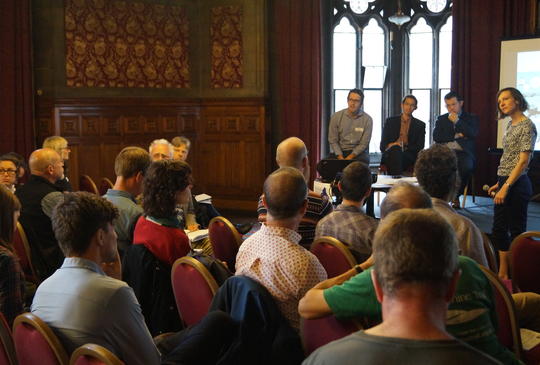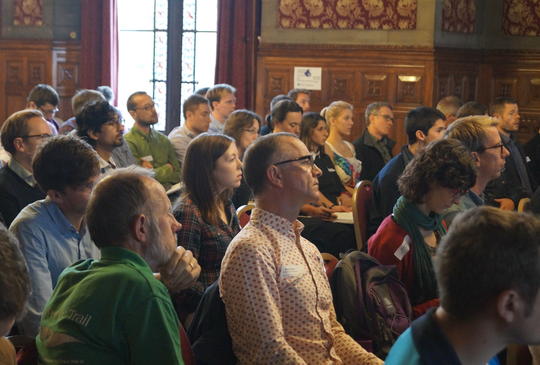
Research meets Cycling - In the City and for the City
With the ever-increasing prominence of cycling and growing recognition of its ability to tackle social, economic and environmental sustainability issues in cities worldwide, the 12th Cycling and Society Research Symposium focused on urban cycling.
Almost a hundred academics and practitioners gathered over 14th-15th September 2015 to present and discuss the latest research under the theme ‘Cycling in the City and for the City’.
Roads into research
Both of us cycle to get around Greater Manchester and work on research related to cycling and urban areas.
It was these joint areas of work that brought us to the cycling symposium in Newcastle in 2014 where we realised that there is a huge untapped potential to connect academic research with practice to jointly increase understanding, impact and rigour.
We were excited about the opportunity to host the annual symposium in Greater Manchester to keep up the momentum generated by local activities such as campaign groups and the Velocity programme, and to contribute to national and international debates on cycling.
Cycle Tours
Before the symposium got into full swing, delegates arriving on Sunday afternoon were treated to a choice of two ‘Cycle Safari’ tours: an ‘Infrastructure Safari’ supported by Manchester Bike Hire around Manchester and Salford, and a ‘Lowry by Bike’ tour bringing together cycling and the city’s cultural heritage.
Many of the delegates had never been to Manchester, so both tours were an ideal way for visitors to explore the city and get to know their fellow delegates.
That’s Manchester TV provided coverage of the symposium before participants set off on their bikes.
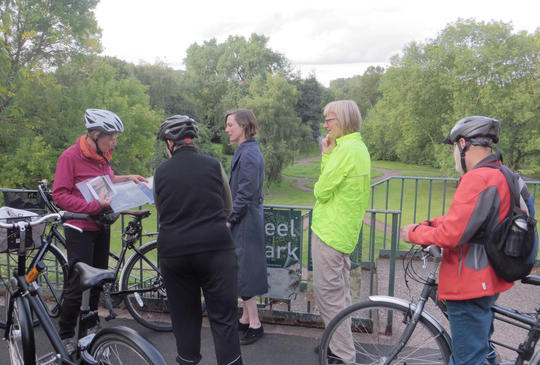
Day 1 – Manchester Town Hall
Keen to connect policy and research, we were pleased that Ian Graham, Principal Policy Officer at Manchester City Council (MCC) as well as Cllr Chris Paul, Transport for Greater Manchester (TfGM) Committee Member and Cycling Champion, welcomed the audience to Manchester Town Hall.
Both elaborated on existing programmes to make the city more cycle friendly and reflected on the challenges involved.
Having experienced the roads by bike the day before and listening to local policy makers at the event, generated an invaluable sense of place for the conversations.
It was not the first time that cycling and research were discussed in such a festive atmosphere right next to Manchester’s Albert Square.
Earlier in 2015, we supported the organisation of an exciting project hosted by Design Informatics, The University of Edinburgh, titled PuBliC People Cars and Bikes.
This two day workshop explored barriers to a better cycling experience engaging ‘citizens as sensors’ on bikes as part of the Future Everything festival.
Infrastructure & Governance
Things kicked off with a lively panel discussion, during which local authorities and practitioners shared their experience in trying to boost cycling in London, Bristol and Manchester.
Brian Deegan, who works for Transport for London and handles governance, planning and stakeholder engagement in the delivery of major cycling infrastructures, emphasised that it can be time consuming and costly to engage different stakeholder groups in a meaningful way - but it pays off with a better outcome for everyone in the long run.
Chris Mason of Bristol City Council agreed and explained how combining big data research, cycling advocacy and planning expertise was very useful during the development of the Bristol Cycle Network.
Simon Ho of TfGM then argued that there are new opportunities to cut congestion and increase bike ridership through the The Internet of Things and the Electric Bike.
Cycling from 8 to 80
Cycling is not only for MAMIL’s (Middle Aged Men In Lycra) and needs to be normalised across all different types of groups and people.
The session 'Cycling from 8 to 80' sought to understand barriers for older and younger people.
Asking the question: 'Do preferences differ by age and gender?' Rachel Aldred and Bridget Elliott of Westminster University have found that all groups prefer to cycle away from motor traffic, however women tend to have stronger feelings on this issue.
Wilbert den Hoed of Newcastle University highlighted mobility opportunities such as enhancing access in the city, social inclusion and wellbeing when 'Understanding cycling over the life course'.
To do this right from the start, Oskar Funk of Roskilde University found that previously car-centred schools can utilise the support of parents and teachers in mastering cycling in order to 'Set the children free'.
Some of the most technologically advanced cycling research is conducted within the cycle BOOM project, which aims to understand cycling experience among the older population through bio-sensing.
Carl Mann and Justin Spinney of Cardiff University are recording galvanic skin response (GSR) and proximity data in combination with GPS tracking while cyclists move around a way-marked cycle route with the aim of producing a ‘map of affect’.
Conflicting notions on cycling
Any discussion around cycling cannot ignore the reality that sharing space is seldom conflict free.
Cosmin Popan of Lancaster University invited the audience to experience 'The sensescapes of cycling' when navigating through the city with Kraftwerk’s Tour de France as a soundtrack.
Wrapping food for thought in a beautifully designed and fun animation, Lucas Brailsford explored cyclist disobedience in Amsterdam and proposed that building 'a more lawless cycling society' might be in fact the sign of a more healthy cycling culture.
The session was concluded with a guest presentation by Pete Abel of Greater Manchester’s Love Your Bike campaign group on his experience of being at the intersection between civil society and local authorities.
Cycling Uptake
One increasingly important issue is health. A public health overview by James Woodcock from CEDAR provided surprising insights e.g. that the benefits of increased activity, especially in the older age, outweighs potential dangers associated with injuries and air quality.
Paul Wilson from the University of Salford also raised critical question surrounding the costs and benefits of Cycle Hubs and their actual impact in making every day cycling more normal.
Raymond Pritchard from the Norwegian University of Science and Technology meanwhile engaged his audience with Bicycle route choice data – an overview of methodological approaches to the world of big data for cycle planning.
Robin Lovelace of Leeds University and James Woodcock of the University of Cambridge have developed a tool for quantifying the potential for cycling with the aim of empowering planners and campaigners when making the economic case for cycling infrastructure.
The National Propensity to Cycle Tool (NPCT) was proposed by the Department for Transport with the intention of enabling more effective prioritization of funding for cycling in England and elsewhere.
The development of the tool 'involved analysis of current cycling behaviour, scenario-based models, and the creation of an on-line interactive tool', says Lovelace.
Their intention is that NPCT will not only aid understanding of where cycling may become more prevalent, but also what the associated health and carbon benefits might be.
Day 2 – Media City, Salford
The second day of the symposium, held at Salford University’s Media City campus, featured discussions on ways we can understand and conceptualise cycling and the implications of promoting the activity and trying to boost take up.
The current ‘bikegeist’ was put into the context of car-centric societies in which ‘vanilla infrastructure’ dominates and cycling remains a contested practice.
Admittedly, the day started a little late as we ironed out difficulties with the venue being overwhelmed by bikes outside and folding bikes inside but this provided a useful case study in how prepared our cities are (not) for the surge in cycling that we want to see.
Delegates were welcomed to Salford by the Reverend Andy Salmon, Chair of the Salford Cycle Forum, who explained that Salford has been improving conditions for cycling, but that the city faces familiar challenges.
These include limited funding and pressures on already stretched council budgets as well as the need to compete with private car traffic both in terms of road space allocation and political will.
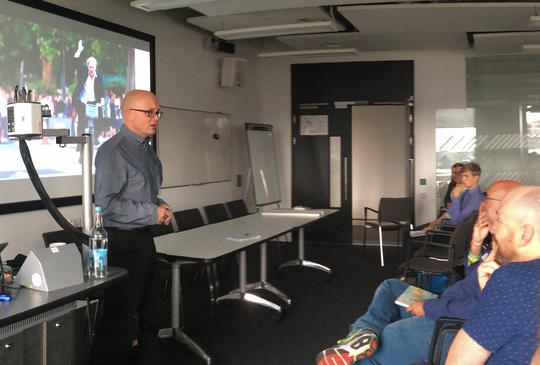
Steve Connor, CEO of communications agency Creative Concern, explained that in his view there is, on the one hand, evidence of a ‘Bikegeist’, as interest in cycling increases and recognition of its benefits grows and, on the other, a context of ‘autohegemony’ in which provision for the car dominates.
The language that we use is important and can help to normalise cycling.
Talking about ‘cyclists’ emphasises difference and conjures up pictures of sporty types in lyrca, whereas talking about ‘people on bikes’ helps to emphasis sameness and remind people that they fill the same roles (parent, neighbour, colleague, employee) as those in cars – people on bikes are people too after all.
Steve suggested that those who already cycle are ‘the brand’ and can help to present a positive image, including how we present ourselves when we cycle and how we behave in relation to other road users.
Why don’t more people cycle?
The subsequent presentations responded to this challenge of boosting cycling in a car dominated society.
David Wildman, of Mouchel, in ‘What are the real barrier to cycling in the UK?’, gave an overview of the barriers to cycling.
He emphasised the importance of understanding human and behavioural factors alongside technology and infrastructure.
Joran Soli of the Norwegian University of Science and Technology, shifted the scene to Norway and to the growing interest there in electric bikes. By making hillier terrains more accessible, his presentation asked, can they in effect, flatten out Norway?
Electric bikes share many of the benefits of regular bikes: they save time, they’re easy to park and they have low emissions.
They’re relative ease is an added benefit, with interviewees in their study claiming ‘they don’t think twice’ before using them and hilly terrains can feel flatter and easier.
This linked to the notion of a ‘comfort bike’, freeing the user up from worrying about hills and, to some extent, weather, presenting significant benefits and seemingly making cycling a viable option more of the time.
However, his research identified concerns about riders being seen as ‘cheaters’ amongst the wider cycling community.
James O’Hare from Newcastle University presented on ongoing PhD research ‘Using techniques from market research to help us understand the reasons people do or don’t cycle’, in which he is seeking to understand barriers to cycling through market research concepts, such as understanding user needs and expanding the customer base.
Magda Cepeda, of the University of Leeds, talked about her PhD research, ‘Perception of social class and status to cyclists acting as barriers for cycling’ , which concerns road user perceptions and attitudes as barriers to cycling with Mexico City as a case study.
With a relatively low cycling rate (around 2% of total trips) and commuting in peak times commonly taking up 3 hours of the working day, there is clearly scope for people to benefit from cycling.
Her research resonates with our earlier discussion of people cycling as ‘the brand’ as she aims to understand the role of identity amongst people who cycle and the extent to which the ways in which people perceive cycling influence the individual’s choice of transport mode.
Meredith Glaser and Sophia Schuff from Copenhagenize and the Danish Institute for Study Abroad approached their contribution from the point of view that countries that have good provision for cycling, and high cycling rates, have a moral duty to share their knowledge and experiences.
Through a world café style workshop we discussed the role of study tours and other learning mechanisms in this.
Chris White of the University of Chester presented initial findings from PhD research, which looked at the experience of Cycling Demonstration Towns in the UK.
Chester, his focus, was awarded Cycling Demonstration Town funding in 2005, which took the form of the Cycle Chester programme.
The research has highlighted the complexities that arise, showing the differences in opinion about what infrastructure should be put in place, not only between those who cycle and those who do not, but also between individuals and groups in the cycling community.
The fieldwork highlights the tendency for lowest common denominator – which Chris termed ‘vanilla’ schemes - to dominate, raising the question of how best to mediate the variety of potentially conflicting viewpoints in order to find planning outcomes that everyone is happy with.
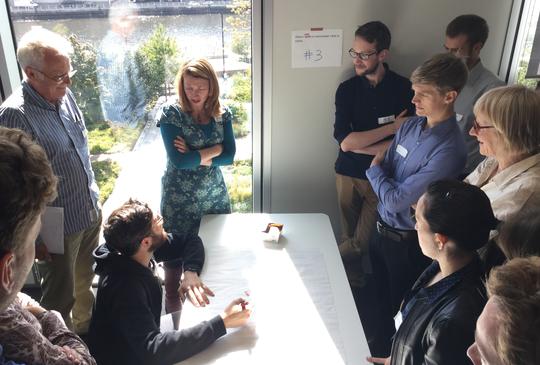
Cycling Practice
The final panel session looked at cycling practice. Katja Leyendecker, a PhD student at Northumbria University, reported on her comparison of Newcastle and Gateshead with Bremen, Germany – quite different cycling contexts, with mode share of 1% and 25% respectively.
In ‘Public perceptions of cycle space’, she spoke about the way cycling practice is gendered in women’s lives, with women still likely to be the main care giver, have responsibility for the school run, chain trips, manage complex travel patters and to have greater concerns about safety and security.
In societies with relative high rates of cycling, a greater proportion of women make these trips by bike, whereas in low cycling societies they are more likely to be done by car.
Mikkel de Vries Baekgaard and Andreas Hansborg Olsen of Aalborg University in Copenhagen, presented work on cycling as an embodied practice in a Danish context.
Their study, ‘Understanding cycling as an embodied practice’ used desire line studies, observation and ride-along interviews within a ‘staging mobilities framework’ that brings together physical settings, social interactions and embodied practices.
They argue that even in countries like Denmark, that are thought of as leaders in cycling infrastructure, it is still the case that the city as a whole is car centric, and that, through physical design, car-centricism determines how those on bikes behave.
It is self-evident that countries such as Denmark continue to have substantial car use and that cycling infrastructure must to some extent fit around general traffic, but given the amount of investment and political commitment to cycling in Denmark, it does suggest that there are degrees of car-centricism: with the UK and Denmark being quite different places.
Nevertheless, this was an important message that challenges the tendency to see Scandinavia and the Netherlands as panaceas.
Our final presenter, Vicky Wesslowski, of Facilitating Sustainable Practices in Hamburg, took us further afield to Santiago de Chile, speaking about her recent PhD research into facilitating cycling in ‘building and growing urban transport cycling in Santiago de Chile’.
She conceptualised cycling as a contested practice: it competes for road space with driving; it is seen on the one hand as something that is environmentally friendly and healthy and, on the other, as dangerous; as a community of practice it is dispersed.
In a context where automobility dominates, she argues, interventions to facilitate cycling emerge from this system and although they open up space for cycling, that space is still shaped, through planning regulations and design standards, by the dominant practice of driving.
Conversely, interventions that aim to grow a community of practice around cycling tend to emerge form the core of the community, rather than the system of automobility.
Conclusions: Normalising cycling in the city?
Presenters provided delegates with valuable insights from the world of cycling, specifically from the UK, Europe, Mexico and Chile.
What is striking is the similarity in experience in planning for cycling across these countries.
In all of them the dominance of the private car in city planning presents a challenge, to varying extents, even in those northern European countries that are often held up as exemplars of cycle infrastructure and culture.
Despite the increasing ‘Bikegeist’ that sees recognition of the overwhelming value of cycling to a range of important agendas including health, climate change and local economies, most cities have yet to see a boost in cycling that could genuinely ‘normalise it’ and put it on a par with the other modes of transport.
Whilst those who cycle are the ambassadors of cycling, and represent the brand that is cycling, they cannot bring about this change alone. And whilst there may appear to be agreement at the strategic level of what is needed, this is not necessarily matched with consensus at the local level, even amongst those who want to see more people on bikes.
Therefore we were excited to see new collaborations formed after the symposium, that bring different people and backgrounds together to address there challenges.
For example this January, Dr. Paul Wilson from Greater Manchester Cycling Campaign, together with CycleHack Manchester, organised a workshop on Normalising Cycling.
The idea came during the symposium, to bring research together with local groups and think of small actions that we can do every day that make cycling more normal and therefore encourage more people to get on bikes.
What’s next?
We remain inspired by the diversity and new collaborative ways academic research can support local action and policy making.
As such we are sure that Manchester and cities worldwide can look forward to many more initiatives to unfold that will advance the role of the bike as a tool for sustainable change.
The next edition of the Cycling and Society Symposium will be held in Lancaster, the city that hosted it for the first time.
Please visit www.cyclingandsociety.org to find out more as details are confirmed for next year's symposium.
If you would like to stay in touch on academic discussions in relation to cycling, you can subscribe to this mailing list.
More locally, there’s the Manchester Cycle Forum, the Salford Cycle Forum, and the Greater Manchester events cycling calendar run by Love Your Bike.
Acknowledgements
The symposium benefitted from financial support from Transport for Greater Manchester and the University of Salford, and Manchester Town Hall was provided as a venue by Manchester City Council.
Authored by Gabi Schliwa and Graeme Sherriff.
Going Dutch? Greater Manchester builds a £20m bid for cycle superhighways
Contributed by Steve Connor
Contributor Profile
Gabi is PhD researcher in Human Geography at The University of Manchester. Her research concerns public participation in urban governance. Being curious about human-centred design and digital technologies, she is currently exploring the role of citizens within the concept of the smart city.


